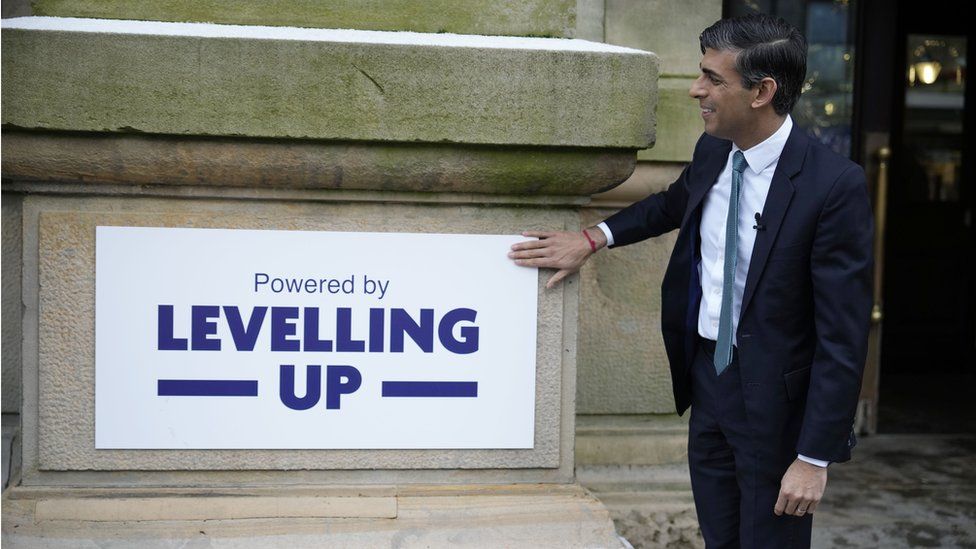Only 10% of flagship levelling up funds spent, say MPs
- Published
- comments

Only 10% of funding promised to reduce inequality as part of the levelling up agenda has been spent, MPs have said.
The Public Accounts Committee found ministers were "unable to provide any compelling examples of what levelling up funding has delivered so far".
It also criticised a "worrying lack of transparency" in how cash was allotted.
The government said it expected spending to pick up in later years of the programme, adding: "Buildings don't go up overnight."
But the MPs found that, on average, a bid for funds cost a local authority around £30,000 and that rule changes while bids were being assessed "wasted scarce public resources".
The government's levelling up policy, a key plank of the Conservatives' 2019 general election manifesto, aims to tackle regional inequalities by backing projects that boost towns, local transport and culture.
The cross-party committee, which scrutinises government spending to assess its value for money, looked at the progress of the Levelling Up Fund, Towns Fund and the UK Shared Prosperity Fund, which together total up to £10.47bn.
It found that only £3.7bn had been allocated to local authorities by December 2023, while councils had been able to spend only £1.24bn as of Sept 2023.
Each fund has different end dates, but all the money is due to be spent by the end of March 2026.
The Department for Levelling Up Housing and Communities (DLUHC), led by Michael Gove, said it was "to be expected that the capital spend ramps up in later years".
The committee said it asked for three examples of "projects that had delivered change".
'Shovel-ready'
While acknowledging that the examples given by DLUHC were "important to their localities", the MPs said they were "relatively small scale compared to the substantial and convincing examples we would have expected the Department to have readily available at this stage".
They also found that "more impactful" bids were losing out because of "optimism bias in favour of so-called 'shovel-ready' projects".
The first round of levelling up funding was awarded to "shovel-ready" projects that were due to be completed this month, but 60 out of 71 (85%) have had to extend their deadlines, with further delays in other schemes said to be "likely".
DLUHC said it was providing "expert support" to councils to tackle delays. But Labour MP Dame Meg Hillier, who chairs the Public Accounts Committee, described the levels of delay as "absolutely astonishing".
Dame Meg added: "In the case of levelling up, our report finds that the government is struggling to even get the money out of the door to begin with.
"We will now be seeking to keep a close eye on DLUHC's progress in unclogging the funding system. Citizens deserve to begin to see the results of delivery on the ground."
The MPs also said they were "disappointed" that DLUHC had no long-term plans to measure the impact of levelling up funds.
A DLUHC spokesperson said: "We're proud that we've committed £15bn since 2019 to often overlooked areas, agreeing historic devolution deals, and shifting power and money out of Westminster.
"This money is regenerating town centres, creating new infrastructure and helping to level up communities across the UK."
During a visit to Sunderland, Chancellor Jeremy Hunt said: "Since 2019, two-thirds of all new employed jobs in the UK have been outside London and the South East."
Angela Rayner, Labour's deputy leader and shadow communities secretary, said the Conservatives had "abandoned any pretence of trying to achieve their mission to level up Britain".
Labour, she added, would end the wasteful "begging-bowl approach to funding bids" and "provide long-term funding settlements to local leaders".
- Published17 November 2023
- Published19 January 2023
- Published15 March